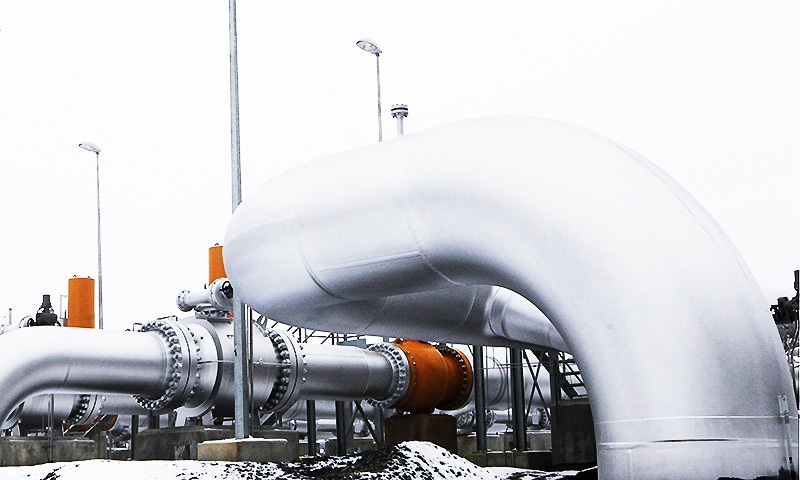Chinese-led consortium termed lowest bidder for power project

ISLAMABAD: The government has announced that a consortium led by China’s Harbin Electric International Company is the lowest evaluated bidder for the Rs82 billion power project in Punjab based on re-gasified liquefied natural gas (RLNG).
To be set up at Balloki-Kasur near Lahore, the 1,000-1,200MW combined cycle power project was offered for international bidding by the National Power Parks Management Company Ltd, a subsidiary of the Ministry of Water and Power. Six local and international pre-qualified parties submitted technical and financial bids by the July 31 deadline.
Official record suggests that the consortium comprising Harbin Electric International and Habib Rafiq Ltd offered a levellised electricity cost of 7.973 cents and was “ranked lowest evaluated bidder”.
Also read :Ministry empowers Ogra to set price of RLNG, paves way for deal with Qatar
But, it is learnt, the bid documents of consortium Power Construction Corp China and Al-Qavi which had outbid the Harbin Joint Venture with a sizeable margin in a similar RLNG-based project in Haveli Bahadur Shah were not opened this time. In that project, Power China JV had offered 7.921 cents per unit as levellised tariff, compared to Harbin-Habib Rafiq JV’s 8.181 cents.
It was explained that provisions of bidding documents required the financial bid of Power China and Al-Qavi to be returned unopened because it had become a successful bidder in the previous project.
Turkish ENKA Construction and Industry Co Inc and GE Consortium stood second with 8.185 cents per unit tariff, followed by China Machinery Eng Co (CMEC) & SEFC (8.304 cents) and Hyndai Engineering of Korea and Descon (8.332 cents).
All the parties offered higher bid for the Kasur project when compared with the Haveli Bahadur Shah project and their ranking remained unchanged except that Power China was replaced by Harbin China.
The bids were evaluated on the basis levellised electricity cost as a function of energy (kwh) generated as well as engineering, procurement, construction and fuel cost over the first 12 years.
After technical evaluation, financial bids were examined on the basis of levellised electricity cost.
It is one of the five RLNG-based projects the government has been pursuing under its fast-track power generation programme. Two of them — one to be located at Haveli Bahadur Shah and another at Balloki — are being actively pursued to overcome electricity shortfall before the 2018 general elections.
The government has set up a special purpose company — National Power Parks Ltd – to implement the public sector projects. The site-specific environmental impact assessment and detailed feasibility reports for the two projects have already been prepared by Nespak in partnership with Germany’s Lahmeyer International.
The Central Development Working Party had in April this year approved a cost of Rs162.8bn for the two power projects (Rs81.4bn each), without any foreign financial assistance. The National Transmission and Dispatch Company will invest Rs7.15bn in providing grid connectivity to the two sites. An amount of Rs45bn has been allocated for the two projects (Rs22.5bn each) under the current year’s Public Sector Development Programme (PSDP), while Rs675 million and Rs756m will be spent on the 500kV transmission line this year.
The Balloki-Kasur project is required to begin commercial operations in 20 months as open cycle operation and shift to combined cycle in 30 months after financial close. However, the government wants these power plants to be functional by summer 2017. The project will use high speed diesel as alternative fuel.
The Cabinet Committee on Energy headed by Prime Minister Nawaz Sharif had in February decided that Rs180bn required annually for LNG-based projects would be appropriated from the PSDP as non-lapsable funds, a part of which may be contributed by the provincial government.
The operation and maintenance of the project will be outsourced like Nandipur for ensuring better performance and facilitation of early privatisation.
The National Electric Power Regulatory Authority (Nepra) has already approved up to Rs10.55 per unit upfront tariff for 3,600MW of LNG-based power projects in Punjab for 30 years, assuming LNG price at $12 per million British thermal units.
The upfront tariff will be subject to change at the time of commercial operation on the basis of foreign exchange rate, customs duties and other charges and insurance cost to a maximum of seven per cent. The tariff promises 15pc internal rate of return (IRR) on equity to investors.
Published in Dawn, October 5th, 2015
On a mobile phone? Get the Dawn Mobile App: Apple Store | Google Play











































